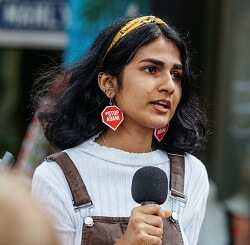By Varsha Yajman
I’ve never been comfortable with the word activism or activist.
I don’t think the word activist itself is an issue but rather the cultural and social implications. The Oxford dictionary states that an activist is “a person who works to achieve political or social change, especially as a member of an organization with particular aims”. I think we all work to achieve political or social change in our own ways, whether it be buying recycling toilet paper or bringing our own bags to the supermarket.
I was exposed to the word “activist” and the “activism sphere” when I joined the climate movement in 2018. The word justice was always put at the forefront – we were not fighting for climate action but climate justice. Instinctively I linked this to bigger concepts about social justice – ones about finding diversity and not only equality but equity.
However recently, especially in the transition from high school to university, I’ve found that the word “activist” or “activism” somehow makes someone superior, letting the individual stand on a higher moral ground to those who do not identify themselves as activists. But the fact is that we are all human and every single one of us, whether activist or not, make mistakes whether that be accidentally calling someone by their wrong pronoun or forgetting to take a reusable bag.
The word activist has begun to create a culture of idealisation, creating impossible standards for both “activists” and those who aspire to make a change. In some sense, the “activist” culture has created a distance between campaigns and movements and people who are looking to join.
I don’t consider myself an activist, I think I’m a person doing my duty as a human being. While I do think that ultimately I do want to see social and political change, I don’t believe that this is what I am necessarily working for. I see myself doing what everybody should be doing and being a young person, it’s even more important as our future is on the line.
If we don’t fight now, then who will? I don’t think that fighting for justice is a compensatory way for the mistakes we make as humans and I don’t think it’s a gateway for validation.
Activism is not just about fighting for social change anymore but rather this social badge of honour that creates a distance between those wanting to take a greater political stand and those who have been involved in campaigns for longer.
In some cases, activism has become a fashion statement or even a fad in some cases. We have seen the trend of activism sweep the world with campaigns like the Black Lives Movement where everyone became a virtual activist and posted a black square on their Instagram. But the fight for social justice does not end with a few posts and this is something that I myself am learning every day – that social justice is about every action we take and how we communicate our own stories about what equality and equity are.
So, while I think the idea behind the word activist is sometimes well-intentioned I’ve also noticed it to become quite tokenistic. It seems like being an activist nowadays almost seems to justify or validate a person.
Our fight for justice does not require a niche culture that can separate people but a common objective of justice.

Varsha Yajman is a first year university student who has been part of the climate movement since year 11. She is an organiser with School Strike for Climate and is the current Schools Coordinator for the AYCC.
Varsha is also our guest editor for the August 2020 edition of the YWCA MISSives newsletter. Sign up now – newsletter signup form is at the bottom of this page!




